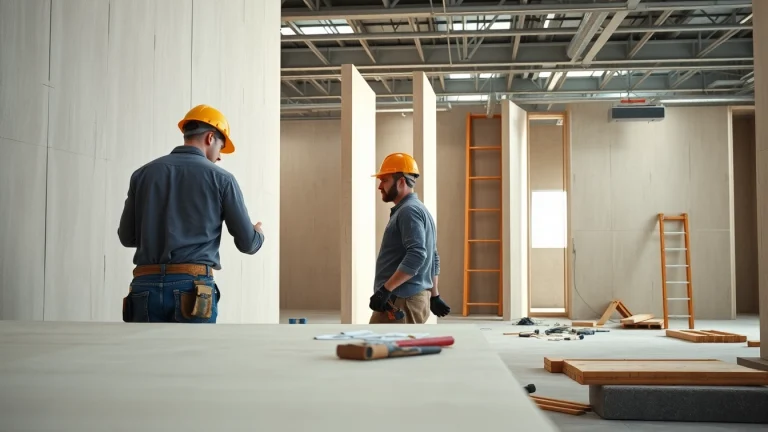
Finding Qualified Drywall Contractors: Your Guide to Quality Installation and Repair
Understanding the Role of Drywall Contractors
When embarking on a construction or renovation project, one pivotal element that comes into play is drywall installation. At the forefront of this essential activity are drywall contractors, skilled professionals specializing in the installation, repair, and finish of drywall. Their expertise is not only vital for aesthetic appeal but also impacts the overall structural integrity of interiors. This article dives deep into the multifaceted role of drywall contractors, including the services they provide, necessary qualifications, and why selecting local contractors can be advantageous.
What Services Do They Provide?
Drywall contractors offer a wide range of services that are essential in both residential and commercial properties. Here’s a breakdown of the primary services they typically provide:
- Drywall Installation: This includes hanging the drywall sheets, taping, and finishing the joints to create smooth surfaces ready for paint or wallpaper.
- Drywall Repair: Contractors address damage due to cracks, holes, or water intrusion. This process often includes patching, sanding, and refinishing.
- Texturing: Various texturing techniques can enhance the aesthetic profile of a room. Contractors are skilled in techniques like knockdown, slap brush, and popcorn texture.
- Framing: Before drywall can be installed, a structural framework must exist, typically done by framing specialists who may work alongside drywall contractors.
- Acoustic ceiling installation: Commonly found in commercial buildings and homes, drywall contractors may specialize in the installation of acoustic tiles for sound insulation.
Key Qualifications and Certifications to Look For
Hiring a qualified drywall contractor requires understanding their qualifications and certifications. Here are some essential aspects to consider:
- Licensing: It’s crucial that drywall contractors hold valid licenses specific to your state or region. Licensing ensures that the contractor complies with local building codes and regulations.
- Insurance: Look for contractors who are insured. Insurance protects you from liability in case of accidents or damages during the project.
- Certifications: While not mandatory, certifications from renowned organizations can signify a contractor’s commitment to high standards and continued education in drywall installation and repair techniques.
- Experience: A contractor with extensive experience not only demonstrates skill but often comes with a wealth of problem-solving capabilities learned through past projects.
The Importance of Selecting Local Drywall Contractors
Selecting local drywall contractors offers numerous benefits. First and foremost, local contractors are often more familiar with regional building codes and regulations, ensuring compliance and minimizing delays. They may also have established relationships with suppliers, which can lead to better material rates and shorter lead times. Furthermore, local contractors generally have a vested interest in maintaining their reputation within the community, leading to higher quality work and customer satisfaction.
Cost Factors In Hiring Drywall Contractors
Understanding the financial aspect of hiring drywall contractors is crucial for any project. The cost to hire professionals can vary significantly based on multiple factors. Below are the key components affecting the overall cost.
Breakdown of Average Installation Costs
The average cost of drywall installation tends to fluctuate based on location, the complexity of the job, and the contractor’s experience. Generally, homeowners can expect to pay between $1.50 to $3.00 per square foot for installation. However, additional factors can lead to higher or lower costs:
- Material Costs: Standard drywall sheets may cost about $0.40 to $0.65 per square foot, while moisture-resistant or soundproof drywall variants come at a premium.
- Labor Costs: Labor charges can typically range from $30 to $80 per hour depending on the contractor’s expertise and the project’s complexity.
- Preparation Work: Costs may rise if extensive preparation is necessary on walls and ceilings before installation, such as repairing existing damage or removing old drywall.
- Finishing: Finishing work, including taping, texturing, and painting, is often charged separately, especially for high-end finishes.
Common Pricing Structures: Hourly vs. Flat Rates
Contractors may choose to charge either an hourly rate or a flat rate based on the scope of work. Understanding these structures can help homeowners make informed decisions:
- Hourly Rates: Charging hourly can be beneficial for smaller jobs or unpredictable projects where the scope may change. However, this can lead to higher costs if the project extends longer than expected.
- Flat Rates: For larger projects, flat rates can provide clarity on total costs upfront, reducing the risk of unexpected expenses. This structure is often preferred for new installations or extensive remodels, where the work involved is well-defined.
Tips to Get Accurate Estimates from Multiple Contractors
When seeking out drywall contractors, acquiring multiple estimates can ensure you secure the best deal without compromising on quality. Here are actionable steps to guide you:
- Provide Detailed Information: Share specific details about your project, including square footage, existing conditions, and desired finishes to receive the most accurate estimates.
- Request Itemized Quotes: An itemized quote will break down individual costs for materials and labor, making it easier to compare bids effectively.
- Ask About Contingencies: Inquire if they include a buffer for unforeseen circumstances that could increase costs. Knowing this beforehand can help you budget appropriately.
- Check Availability: Ensure contractors can meet your timeline, as rushed work can lead to lower quality.
How to Choose the Right Drywall Contractor
Finding the right drywall contractor can feel overwhelming given the multitude of options available. However, a systematic approach can simplify the decision-making process and lead to the best possible outcome for your project.
Research and Recommendations: How to Start
Start by gathering recommendations from friends, family, or online platforms. Websites such as Yelp, Angie’s List, or the Better Business Bureau can provide insights into local contractors’ reputations. Additionally:
- Leverage social media to ask for referrals or read local community group experiences with drywall contractors.
- Check online reviews, which can reveal a contractor’s strengths and weaknesses through the experiences of previous clients.
Evaluating Portfolios and Customer Reviews
Once you’ve narrowed down your options, evaluate potential contractors by reviewing their portfolios and customer reviews. Pay attention to elements such as:
- Quality of Work: Reviewing past projects helps you assess craftsmanship and variability in design.
- Consistency: Look for reviews that highlight consistent service delivery, punctuality, and communication.
- Long-Lasting Results: Pictures showcasing completed projects can indicate durability and the company’s ability to produce lasting quality.
Assessing Communication and Service Quality
The communication style and professionalism of a contractor can significantly affect your project’s success. Key areas to assess include:
- Promptness: Did they respond to your queries quickly? Rapid responses often indicate a commitment to customer service.
- Clarity: Are they clear and transparent about their processes, materials, and pricing? A reputable contractor should provide comprehensive explanations without jargon.
- Flexibility: Assess their willingness to accommodate changes or address concerns that may arise during the project.
Best Practices for Working with Drywall Contractors
Once you’ve hired a drywall contractor, maintaining a positive working relationship is key to ensuring the project proceeds smoothly. Here are some practices to consider:
Preparing Your Space for Installation
Before the contractor arrives, take steps to prepare your space:
- Clear the Area: Remove furniture, wall decorations, and other items within the work area to allow unobstructed access.
- Provide Protection: Cover floors and remaining furniture with drop cloths to shield them from dust and debris.
- Communicate Access: Ensure the contractor knows how to access the site and any necessary requirements, such as parking or entry codes.
Setting Clear Expectations and Timelines
Establishing expectations at the outset leads to smoother operations throughout the project:
- Create a Timeline: Develop a comprehensive timeline that includes critical milestones and deadlines, ensuring both parties are aligned.
- Set Quality Standards: Discuss your desired quality and finish, clarifying specific expectations for texture, painting, and finishing touches.
- Regular Check-ins: Schedule regular updates to assess progress and allow for any adjustments to the plan as necessary.
What to Do if Issues Arise During the Project
Even with thorough planning, issues may arise during the project. Here’s how to effectively handle any challenges:
- Calm Communication: Address concerns promptly and respectfully with the contractor. Open dialogue can resolve misunderstandings quickly.
- Document Issues: Take photos and keep a record of any problems for reference. This documentation can aid discussions and help ensure accountability.
- Discuss Solutions: Collaborate with your contractor to find solutions. A good contractor will work with you to find a satisfactory resolution.
Future Trends in Drywall Installation Services
As the construction industry evolves, so do the practices and techniques employed by drywall contractors. Here’s a look at emerging trends shaping the future of drywall installation.
Innovative Techniques Being Adopted by Contractors
New materials and methods are increasingly being integrated into drywall services. Some of the noteworthy innovations include:
- Prefabricated Panels: Prefabricated drywall panels are now available to speed up installation times.
- Curved Drywall: Advances in manufacturing have led to more flexible drywall options, allowing for rounded and curved wall designs.
Eco-Friendly Materials and Sustainable Practices
As sustainability becomes more central in construction practices, many drywall contractors are adapting to eco-friendly materials and methods:
- Recycled Gypsum: Eco-conscious contractors are utilizing recycled gypsum board to minimize waste.
- Sustainable Finishes: Water-based paints and low-VOC adhesives contribute to healthier indoor environments.
The Impact of Technology on Drywall Services
Technology continues to influence drywall contracting significantly:
- 3D Modeling: Contractors increasingly use 3D models to visualize projects, aiding in precision and reducing costly mistakes.
- Estimating Software: Technology streamlines project estimates, allowing for quicker and more accurate bids.


